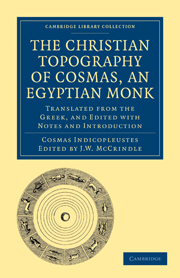 The Christian Topography of Cosmas, an Egyptian Monk
The Christian Topography of Cosmas, an Egyptian Monk EDITOR'S PREFACE
Published online by Cambridge University Press: 10 November 2010
Summary
TheChristian Topographyof Cosmas Indicopleustes is one of the prodigies of literature. The boldness and perverse ingenuity with which its author, from a long array of irrelevant scripture texts, seeks to construct an impossible theory of the universe can scarcely fail to astonish everyone who reads it. It made its appearance at that period in the world's history, when Christendom, fast losing the light of Greek learning and culture, was soon to be shrouded in the long night of mediaeval ignorance and barbarism. The work reflects with singular distinctness this prominent characteristic of the age which produced it; for while Cosmas, on the one hand, held the principles of the Christian faith combined with others pervading the theology then current which led to the darkening of all true knowledge, he had, on the other hand, a somewhat considerable, if inexact, acquaintance with the philosophical and scientific speculations of the Greeks. He may thus not inaptly be compared to a two-headed Janus, with one face turned to the light of departing day, and the other to the shadows of the coming night.
In our Introduction will be found a statement showing the sources whence the text of this unique work has been derived. A biography of its author then follows; next, a synopsis of his cosmological views, and finally, citations of the opinions which have been passed upon his system of the world and the contents of his work generally.
- Type
- Chapter
- Information
- The Christian Topography of Cosmas, an Egyptian MonkTranslated from the Greek, and Edited with Notes and Introduction, pp. ix - xiiPublisher: Cambridge University PressPrint publication year: 2010First published in: 1897


